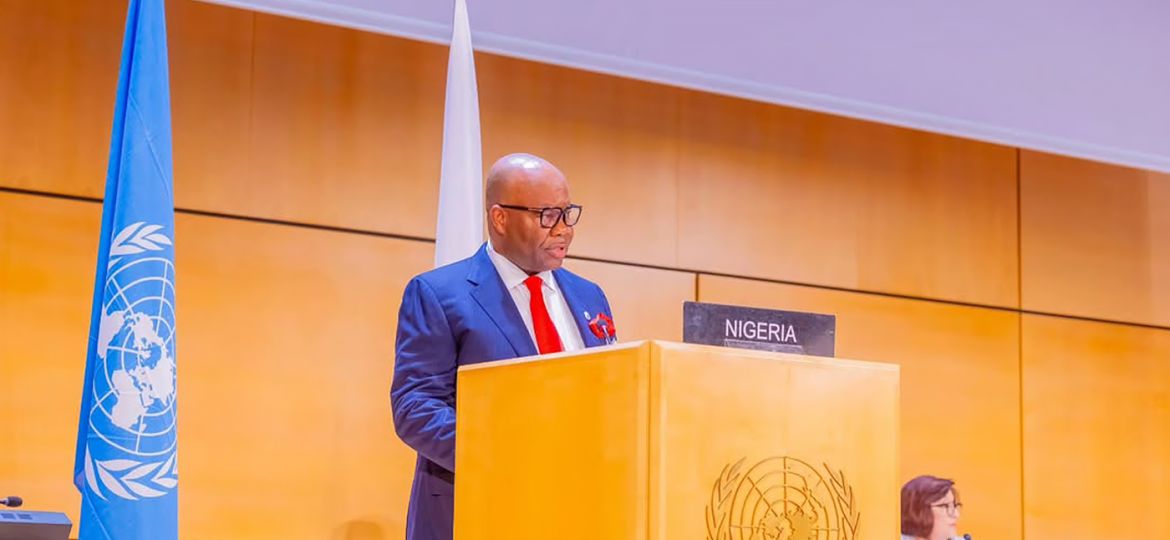
At a time when global tensions threaten the fabric of humanity, the President of the Nigerian Senate, Senator Godswill Akpabio, has delivered a resounding call for unity, courage, and global cooperation.
Speaking at the 6th World Conference of Speakers of Parliaments in Geneva, Switzerland—an event jointly organized by the Inter-Parliamentary Union (IPU) and the United Nations—Akpabio urged parliamentarians from across the world to transcend borders and political divides, and instead forge partnerships rooted in shared purpose and responsibility.
“As parliamentarians, we must move beyond rhetoric and commit to courageous, cross-border collaboration. We must be problem-solvers, vision-shapers, and hope-builders in a world increasingly fractured by conflict and uncertainty.”
In his remarks, Akpabio extended greetings from the Nigerian Senate and the resilient people of Nigeria. He painted a powerful image of a nation tested by adversity but driven by purpose—a country that continues to rise, innovate, and inspire, despite challenges.
“I come from a nation that has endured fire and risen from ashes. A nation that finds clarity in confusion and keeps sailing through storms and rough weather. We legislate in the storm, reform in the furnace, and lead with courage.”
Confronting a Turbulent World
The conference’s theme—“A World in Turmoil: Multilateralism for Peace, Justice and Prosperity for All”—resonated deeply with Akpabio, who described the global moment as urgent and defining. Around the world, conflict silences the music of peace, war uproots homes and futures, and inequality remains a stubborn stain on human progress.
Yet, amid the turmoil, he urged nations not to give in to despair. Instead, he called on lawmakers to act with unity and urgency to safeguard the future.
“These are not distant threats—they are today’s realities. From terrorism and youth disillusionment to climate shocks and farmer-herder clashes, our collective response must be swift and courageous.”
Nigeria’s Bold Legislative Response
Akpabio outlined how the Nigerian Senate is addressing these complex challenges head-on through transformative legislation. Among the highlighted acts are:
- The Control of Small Arms and Light Weapons Act
- The Terrorism Prevention and Prohibition Act
- The Out-of-School Children Education Act
These laws, he said, reflect Nigeria’s legislative commitment to peace, security, and justice.
Beyond security, Akpabio also spoke of Nigeria’s strategic investments in innovation and digital empowerment. The 10-Year National Digital Strategy, Start-Up Act, and expanded youth credit and digital training initiatives aim to close the gap between poverty and potential.
“We are equipping our youth not just to survive—but to lead, innovate, and create. We are closing the divide between despair and possibility.”
Advancing Inclusion and Shared Prosperity
In his address, Akpabio reaffirmed Nigeria’s pursuit of inclusive governance. He celebrated the landmark Not Too Young to Run Act and revealed ongoing legislative work to establish gender quotas, ensuring broader representation of women and persons with disabilities.
He also outlined the country’s holistic approach to poverty alleviation, including:
- Education financing
- Vocational and skills training
- Pro-poor tax reforms
- Direct cash transfers to vulnerable households
These initiatives, he noted, align with the Sustainable Development Goals (SDGs) and represent Nigeria’s commitment to dignified, inclusive development.
A Call to Global Conscience
Akpabio’s message was ultimately one of shared humanity and urgent collaboration. He warned against allowing multilateralism to become an empty slogan and called on global lawmakers to act with determination.
“Multilateralism must not be a shell of good intentions. It must become a global movement of resolve. Humanity is one tapestry—when one corner is torn by injustice, the whole fabric is weakened.”
He ended with a stirring plea to his fellow lawmakers:
“Let us not merely gather—we must lead. Let us build bridges, not walls. Let us legislate with clarity, govern with compassion, and rise—together—as architects of peace, justice, and a shared destiny.”

